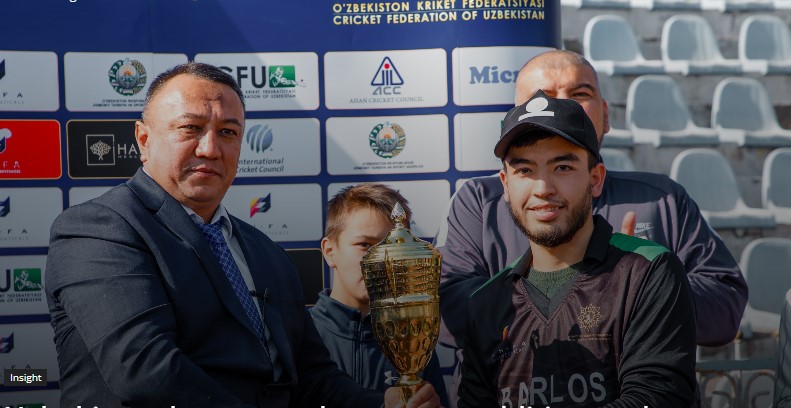
Afghanistan’s fairytale ascension from obscurity to World Cup participation and Full Membership is well known to cricket fans. It is an enthralling and heart-warming story which has been covered extensively by major media publications worldwide. However, it is not just the established cricket nations that are sitting up and taking notice. Afghanistan’s cricket successes are also causing its Central Asian neighbours to take the sport seriously and plant the first seeds of cricket in virgin soils.
One such country is Uzbekistan; where the Justice Ministry confirmed the registration of the ‘Cricket Federation of Uzbekistan’ entity in December 2019. As per the Federation President Mr. Aziz Mihliev, their organisational goals are clear.
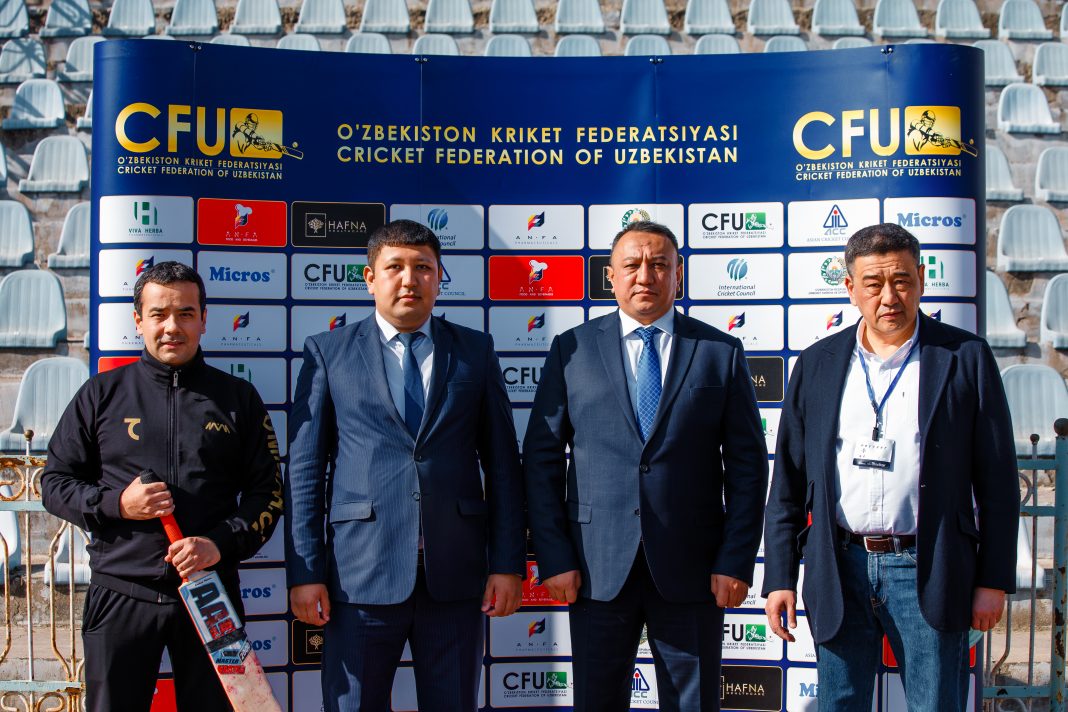
Speaking with Emerging Cricket, Mihliev states that in his view starting a cricket chapter in the country can open Uzbekistan up to new opportunities.
“Since cricket is a popular sport in many parts of the world, we also decided to develop this sport as we believe that our youth are very competent and have shown great results in different types of championships. Cricket can bring new opportunities, new insights, and new goals to our country.”
Furthermore, Mihliev admits that he also has a personal motive. He fondly remembers his college years in India, where he was awed by the sheer passion and joy that locals expressed towards the game. He couldn’t help but catch the cricket bug and eventually this led to Uzbekistan registering a cricket federation; becoming the second country in Central Asia to do so.
History
Most people would not associate cricket with the ex-Soviet Republic of Uzbekistan. The country is rather well known for its majestic mosques, gleaming mausoleums and other historical sites associated with the famous ‘Silk Road’; an ancient trade route which connected China with the Middle East. However, the sport has been played there since 1997, when Indian employees of an Indo-Uzbek healthcare company called Core Pharmsanoat began organising regular cricket games amongst themselves.
The first notable cricket event took place in 1999, when a British Embassy Team played against a motley crew of players from India, Pakistan, Bangladesh and Malaysia, appropriately nicknamed the ‘Commonwealth XI’. Unfortunately, these fixtures were restricted exclusively to the expatriate community, with the native Uzbek population taking very little interest.
Present Day
Since the registration of the cricket federation, momentum has built rapidly. Currently, the federation has Indian trained coaches at their disposal who are sharing their knowledge with other trainers. Participation is also increasing steadily.
“At present we have more than 280 freshman players learning basic game techniques at various districts of our country and two more or less ready teams,” Mihliev explains.
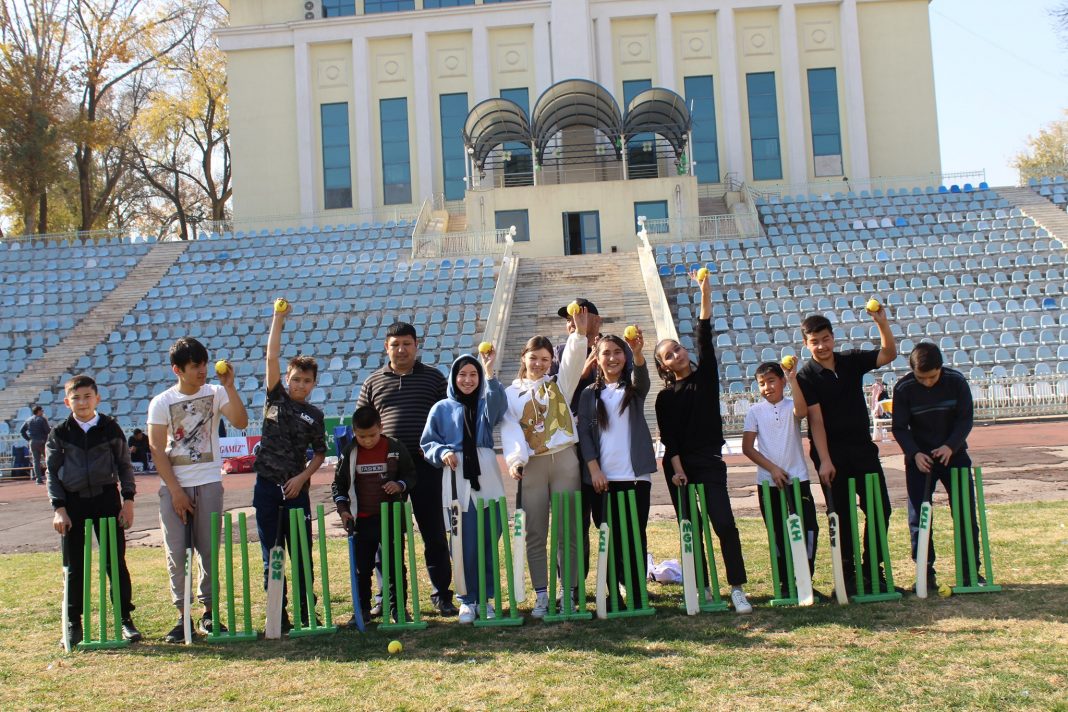
These two cricket teams that Mihliev alludes to above are called ‘Barlos’ and ‘Afrosiyob’. Earlier this month they squared off against each other in the ANFA Tashkent T20 Tournament. This was a historic moment for the sport in the country; being the first time that an officially sanctioned tournament took place with indigenous Uzbek participation.
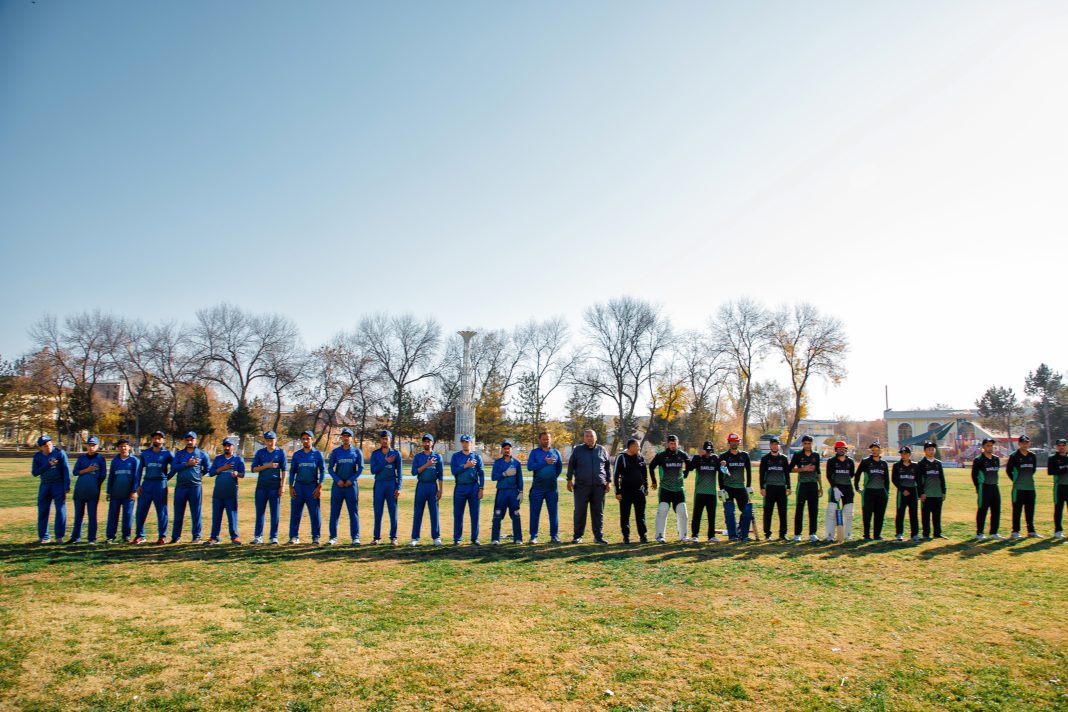
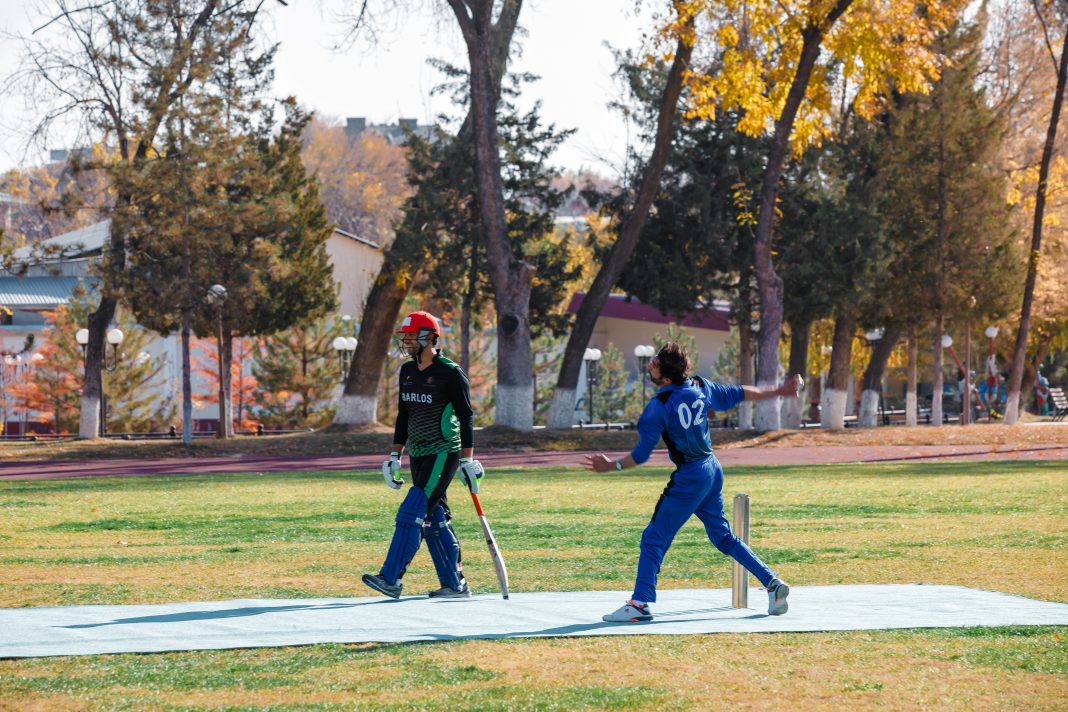
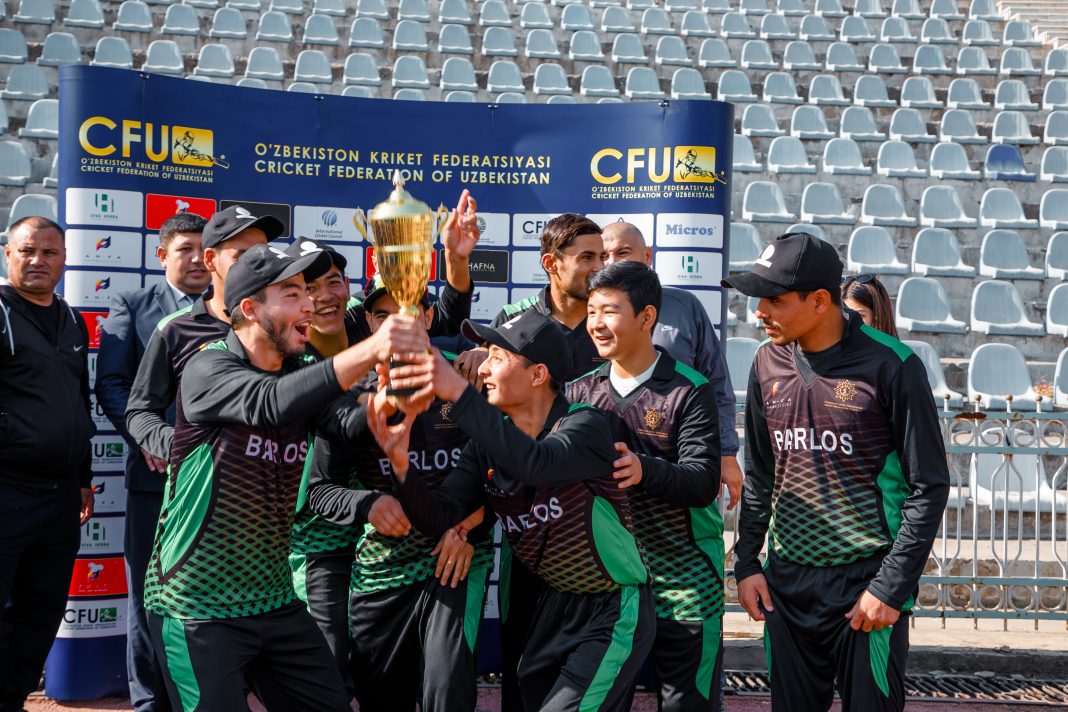
The importance of this tournament cannot be stressed enough. The games were played under the watchful eyes of the National Olympic Committee leadership, along with representatives of the Ministry of Physical Culture and Sports and the Uzbekistan Cricket Federation. It also made national news.
Partnerships
Uzbekistan is also collaborating with their Central Asian neighbours.
“Our Chief Coach Mr. Farkhod Najmiddinov visited Tajikistan last year to meet with the Tajikistan Cricket Federation board members. In his mission, he closely got acquainted with their team and they shared their knowledge about cricket.”
During the visit, the Tajiks presented Najmiddinov with some cricket equipment as a sign of goodwill.
“They gifted us one ball, one pair of gloves, one pair of leg pads, one bat, one helmet, stumps and keeping gloves. It was a really nice gesture by them.”
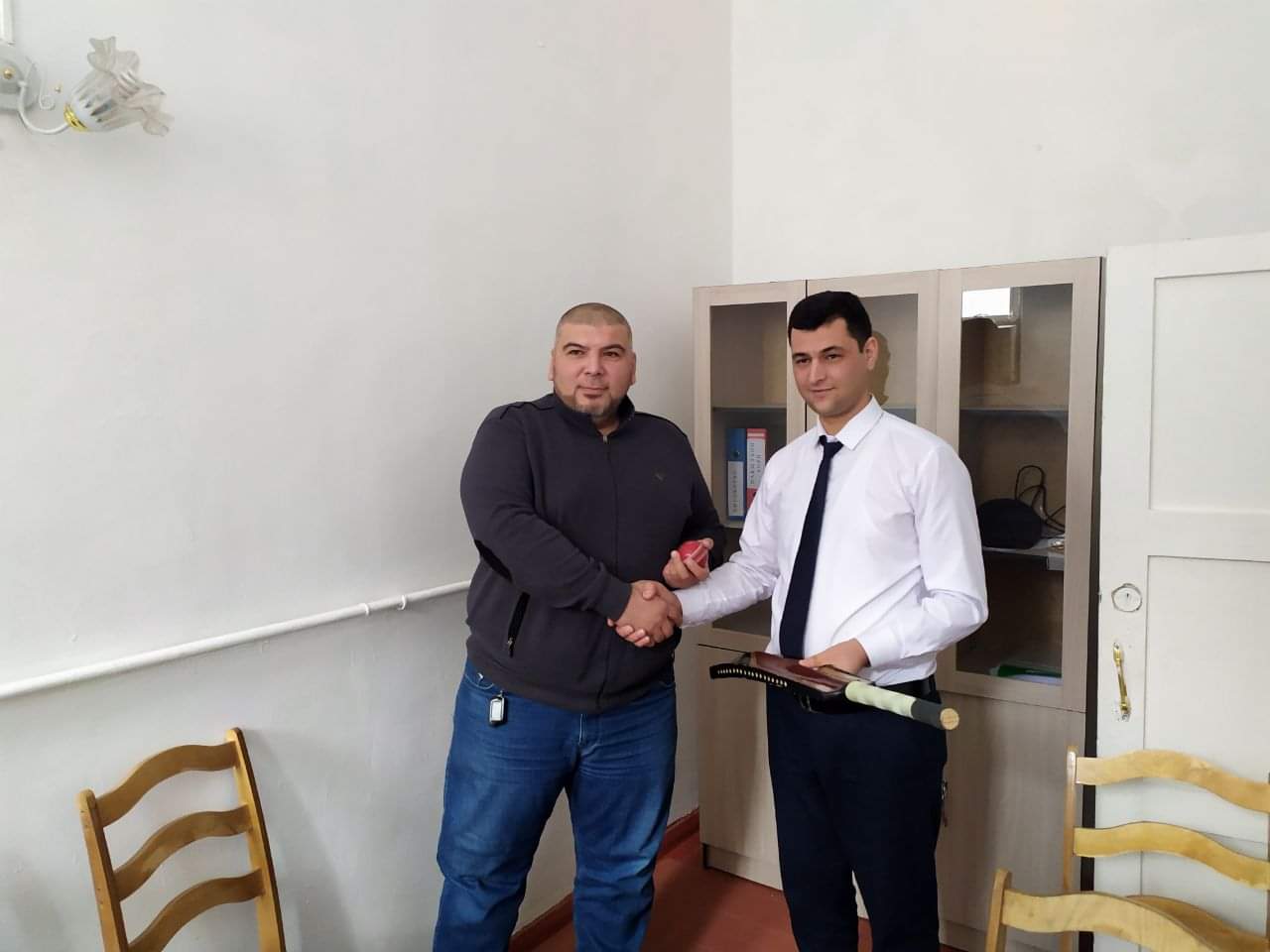
In addition to this, the Uzbek Cricket Federation has paid a visit to the Indian Embassy and met with the Indian Ambassador, Mr. Santosh Jha with a request of financial assistance. Mihliev is hopeful that this help comes through, although the pandemic has proved to be an impediment.
Aspirations
On their future strategy, the Federation are quite clear on what they want to aim for. Asian Cricket Council (ACC) and International Cricket Council (ICC) membership are firmly on the agenda, because as per Mihliev “They would give us a hand as they are developers of this wonderful game”.
Additionally, Mihliev informs me that they have already spoken to ICC about the start of organised cricket in Uzbekistan.
“On my visit to Dubai, I visited ICC personally and met with (ICC Asia Development Officer) Mr. Mohammad Iqbal Sikander. He provided me with tonnes of information about the rules and regulations of ACC and ICC Membership. Moreover, Mr. Mohammed Iqbal gave us his coaching materials, which are greatly helping us to form up our Federation.”
Also, a talent hunt is currently underway, and the Federation is looking to increase participation levels as organising an annual eight-team domestic league is one of the criteria for ICC membership. Long term, Mihliev has ambitious plans.
“In the long run, our goal is to become internationally competitive! Our desire is to be champions in World Championships of any form of cricket tournaments,” he adds.
Uzbekistan is a crowded sports market; therefore, promoting a new sport is a tough job. But the Federation are working closely with partner countries for support. As per Mihliev, they are also speaking regularly with the National TV and Radio distributors so that cricket can be popularized through coverage on News and Sports Channels.
“We are definitely going all out to promote cricket. We are making some TV programs and shows; giving statements to the radio as well.”
Looking Forward
Modern Uzbek society continues to grapple with many social challenges. As with the rest of Central Asia, climate change poses a significant threat, which has been exacerbated by poor farming practices.
During the Soviet era, many rivers which fed into Aral Sea were diverted for use in intensive cotton farming. Starved of its water inflows, Aral Sea has shrunk from 67,000 km2 in 1960 to 4,000 km2 in recent years; thereby causing one of the most devastating ecological disasters in recent memory. The fishing industry has been decimated and extreme temperature fluctuations have increased, due to the disappearance of the moderating effects of the large water body.
To deal with the vagaries in weather, Mihliev is taking a flexible approach.
“Weather conditions cannot be a barrier to our modern society. Taking into account the weather forecasts, we can avoid challenges and adapt accordingly.”
“At present, the Ministry of Sports have given us a ground to launch our activities. We are undertaking some maintenance work now, so it allows us to train outside if the weather is ok. If there is heavy rain or snow falling, we can rent closed stadiums,” he further adds.
As regards to other societal issues, the current government in power is looking to the future by putting in place a lot of reformist measures. One of the main ones has been the dismantling of its 70 years-long practice of cotton slavery, which in the past had caused leading global brands such as Adidas, Zara and Gap to boycott Uzbek produced cotton.
The formation of the cricket federation could be seen as another signal that Uzbek society is trying to open itself up to the world and build relationships with the large South Asian cricketing powers that lie on its not too distant doorstep, in addition to its Central Asian neighbours.
A New Cricket Rivalry?
It is quite possible that with the mutual development of Tajik, Uzbek and Kazakh cricket, we might start seeing Central Asian cricket derbies become a regular occurrence in the next decade or so; itself a wonderfully exciting prospect and the start of a flourishing new cricket rivalry, in one of the unlikeliest regions in the world from a cricketing perspective.
How does watching a T20 tri-series between Uzbekistan, Kazakhstan and Tajikistan at Tashkent or Dushanbe sound?